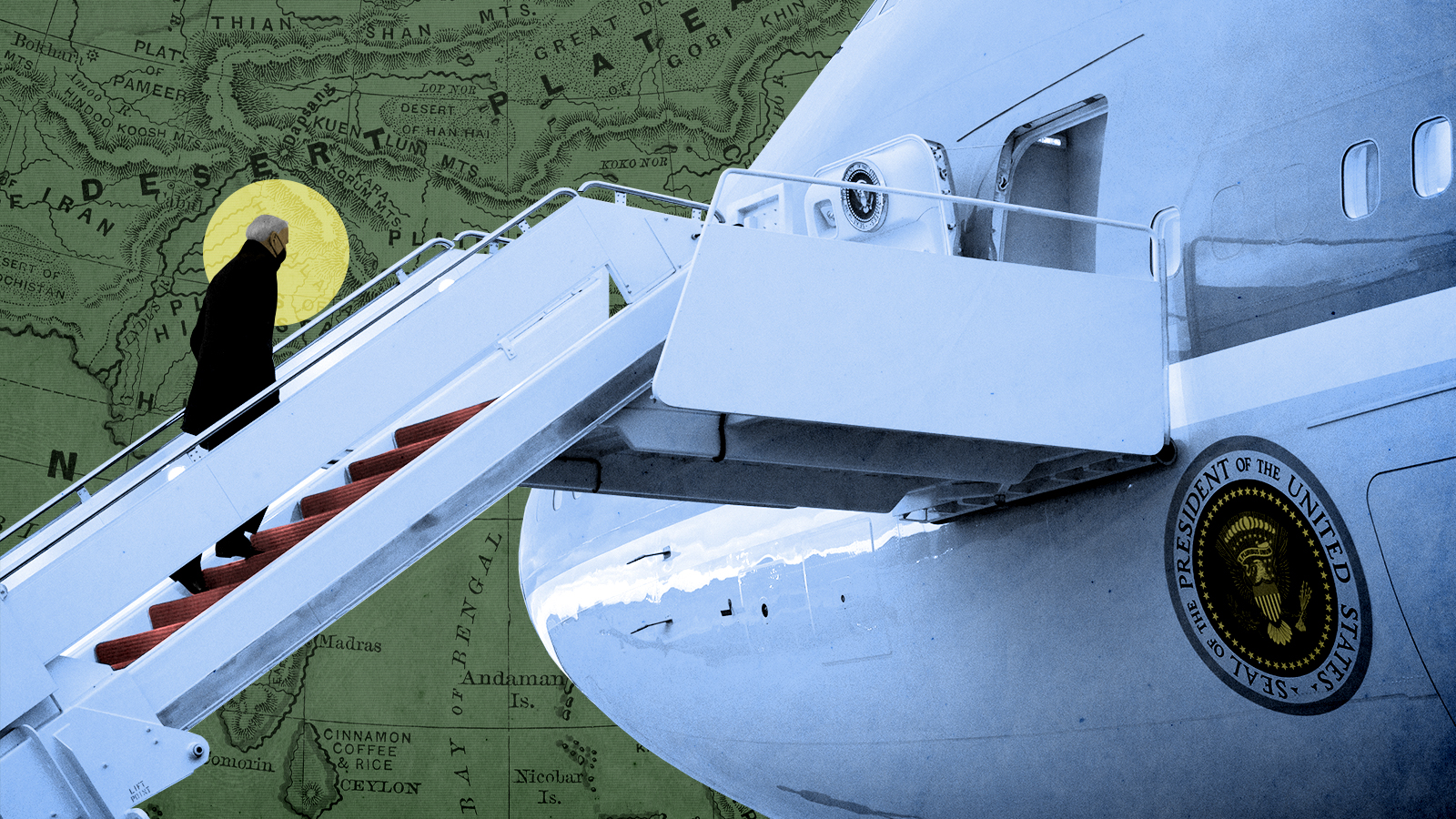Biden's trip to Asia, explained
It will be the president's first time visiting the continent since entering the White House


A free daily email with the biggest news stories of the day – and the best features from TheWeek.com
You are now subscribed
Your newsletter sign-up was successful
President Biden departed Thursday afternoon for a trip to Asia, the first time he's visited the continent during his presidency. But what will he do there, and why is he going now? Here's everything you need to know:
What countries is Biden visiting?
The president's five-day trip begins Friday in South Korea, after which he will travel to Japan to meet with Australian, Japanese, and Indian leaders. The three countries, plus the U.S., comprise the Quadrilateral Security Dialogue, or the Quad, a group revived in 2017 to "better coordinate against China's ambitions in the region," writes The Hill.
Biden's visit also follows last week's two-day summit in Washington, where leaders of Southeast Asian nations convened at the White House to talk about China with the president.
The Week
Escape your echo chamber. Get the facts behind the news, plus analysis from multiple perspectives.

Sign up for The Week's Free Newsletters
From our morning news briefing to a weekly Good News Newsletter, get the best of The Week delivered directly to your inbox.
From our morning news briefing to a weekly Good News Newsletter, get the best of The Week delivered directly to your inbox.
What's on the agenda for this trip?
Biden hopes to reassure allies that the U.S. can handle two foreign policy threats at once. Much if not all of the administration's attention as of late has been directed toward Russia's war in Ukraine, overshadowing the "top foreign-policy priority of countering China," The Wall Street Journal notes. In traveling to Asia, Biden plans to restart such initiatives and "show that his administration can multitask when it comes to leading coalitions against aggressive superpowers," writes The Washington Post.
In South Korea, Biden will meet with newly-elected president Yoon Suk-yeol, who is hoping to "reinvigorate defense ties with the U.S.," the Journal notes. And in Japan, the Quad will convene an in-person summit to discuss concerns regarding China's expanding influence in Asia.
The president is also expected to talk economy with both South Korea's Yoon and Japanese Prime Minister Fumio Kishida, per the Journal, "part of the formal launch of the administration's new trade initiative, the Indo-Pacific Economic Framework." The new framework is geared toward fostering economic ties with Asia-Pacific nations "to address issues such as digital trade, supply-chain resilience, and green technologies."
"These two weeks of Asia meetings are a great signal to an important part of the world that we haven't forgotten about them, but progress on economic matters is what's going to really count," James A. Kelly, former assistant secretary of state for East Asian and Pacific affairs, told Politico.
A free daily email with the biggest news stories of the day – and the best features from TheWeek.com
The trip will put Biden's Indo-Pacific Strategy "on full display" while simultaneously demonstrating how the "United States can at once lead the free world in responding to Russia's war in Ukraine, and at the same time chart a course for effective, principled American leadership and engagement in a region that will define much of the future of the 21st century," National Security Adviser Jake Sullivan said Wednesday.
What challenges await him?
Perhaps most notably, North Korea is believed to be preparing a nuclear test or a long-range missile test while Biden is in the region, U.S. and South Korean intelligence has indicated. And the timing of such a move is hardly a coincidence, Yang Moo-jin of South Korea's University of North Korean Studies told the Post. "If North Korea conducts a long-range missile or nuclear test during Biden's Seoul visit, it clearly marks a deliberate provocation aimed at extorting concessions from Washington," Yang said. Washington and Seoul are preparing a joint "Plan B" in the event of such a provocation.
Biden will also have to work through a strained Japanese-South Korean relationship, as well as push hard for support of the Indo-Pacific economic framework, which has already "sparked skepticism due to ambiguity about its scope and intent," Politico writes.
Will the leaders discuss the war in Ukraine?
It is very likely, yes. For one thing, it seems the war has accelerated an already-forming, China-countering alliance between Europe, the U.S., Asia, and Australia, experts have said, per NPR. India, however, has been much more reluctant to criticize Russia given the historical alignment between the two countries.
Security analysts are also concerned that, in witnessing Russia's attack, China might feel encouraged to increase military pressure on or launch its own invasion of Taiwan, adds the Journal. In fact, the Russian invasion of Ukraine is seen in Asia as a "mirror image" for how China could attempt a Taiwan invasion, Yuko Nakano, fellow of the Japan chair at the Center for Strategic and International Studies, told the Hill.
How does China feel about all of this?
Per Politico, Beijing is "panicking" at the idea of Biden's trip. China's Foreign Ministry has "launched a desperation-tinged campaign to warn key regional U.S. allies" against joining in the president's efforts, with the Chinese foreign minister calling both his South Korean and Japanese counterparts earlier this week. And on Wednesday, China's top diplomat Yang Jiechi reportedly called Sullivan to complain that "the U.S. side has taken a series of wrong words and actions to interfere in China's internal affairs and harm China's interests." Long story short: It appears Chinese officials aren't exactly happy.
Will Biden visit the Korean demilitarized zone?
No — Biden will not visit the DMZ, White House press secretary Karine Jean-Pierre said Wednesday.
Brigid Kennedy worked at The Week from 2021 to 2023 as a staff writer, junior editor and then story editor, with an interest in U.S. politics, the economy and the music industry.
